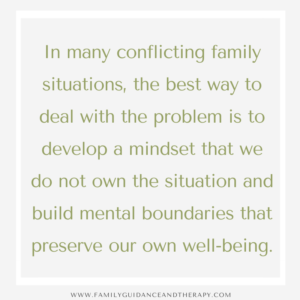Does this sound familiar to you?
Conflict is a part of human nature. It happens.
But it is not easy to process when it involves our own family.
Many families bicker over trivial things, but when it escalates to constant fighting and finger-pointing, it often feels deeply personal, upsetting, and overwhelming.
It takes a lot of energy to deal with argumentative people, and especially when it involves family.
So, how do you maintain your sanity when things are bad enough that you don’t want to go home anymore?
Prepare Yourself
In many conflicting family situations, the best way to deal with the problem is to develop a mindset that we do not own the situation and build mental boundaries that preserve our own well-being.
Mentally prepare yourself before family gatherings to focus only on the content of your family discussions, and not any anger.
Avoid blaming yourself and avoid feeling personally attacked. The overall personality of your family usually has nothing to do with you.
Self-Absorbed Personalities
Families with argumentative personalities often have strong self-absorbed personalities. This shows up as a lack of empathy—not seeing or caring how their behavior affects others.
When faced with conflict or differing views, self-absorbed people often go on the defense. They habitually blame others or other circumstances in life, and seldom, if ever, place the fault on themselves.
They often feel insecure, and fight to compete with others and to hold their own ground.
You cannot change others that have these tendencies, but you can change yourself by understanding that this is what you are dealing with and that more often than not, it has nothing to do with who you are.
Avoid the Arguments through Communication
It may be impossible to avoid all arguments, but you can use communication skills to prevent the sparking of an argument.
The best communication tool is listening.
When we listen with our entire being, we hear what other people are saying.
We do not hear bits and pieces. We do not jump in and finish sentences for others.
We allow others to express themselves, and our body language reflects that we are listening and that we understand what is being relayed. We repeat back what we have heard. We show empathy.
These listening measures help to squash anxious feelings in others and diminish feelings of competition and insecurity.
Do not bring up topics that may trigger confrontations, such as religion or politics. Have an awareness of the hot topics in your family and avoid conversations that may add fuel to the fire.
When your family argues, do not pick sides.
You can empathize with situations, and validate when feelings are hurt but do not defend one person above another.
At all measures, avoid being the go-between in family arguments. Be prepared to physically remove yourself for a while—take a walk, go for a drive, or go into another room until the argument ends.
Develop Separate Relationships
We care about our families. We care about people.
Sadly, you may not be able to gather with your entire family if you want to maintain peaceful family relationships. The differences in personalities and relationships may not support any level of peaceful gatherings.
When you support and build family relationships individually, you are not taking sides, but you are acting as a support system to others and, in turn, you are building your own support system.
You are developing a relationship that enables you to share the disappointment and overwhelm that you feel about your family situation, and you communicate what your expectations are (i.e., peaceful family gatherings with no bickering). This release is vital to your overall mental health.
Your Well-Being
While you want to be loving and attentive to your family, you should not compromise your well-being to keep the peace.
Your mental boundaries are key to your well-being. Choosing to live a calm life with less stress is not selfish in any way, shape, or form.
You may feel that your well-being necessitates time with family but remember that you should surround yourself with supportive people who care about you.
Sometimes, this takes creativity. Imagine gathering with fun-loving people who enjoy spending time together (family or not).
“There are friends, there’s family, and then there are friends that become family.” - Unknown
Reach Out for Help
Sometimes it is hard to get beyond the overwhelm. It can shadow the truth of what we really need and should do for ourselves.
We can help.
Call 619-600-0683, ext. 1, text us at 619-607-1230 or schedule an appointment online. We have both virtual and face-to-face sessions available.

